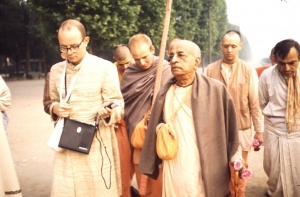CC Madhya 13.147: Difference between revisions
m (1 revision(s)) |
(Vanibot #0054 edit - transform synonyms into clickable links, which search similar occurrences) |
||
| (One intermediate revision by one other user not shown) | |||
| Line 1: | Line 1: | ||
{{ | [[Category:Sri Caitanya-caritamrta - Madhya-lila Chapter 13|C147]] | ||
<div style="float:left">'''[[Sri Caitanya-caritamrta|Śrī Caitanya-caritāmṛta]] - [[CC Madhya|Madhya-līlā]] - [[CC Madhya 13|Chapter 13: The Ecstatic Dancing of the Lord at Ratha-yātrā]]'''</div> | |||
<div style="float:right">[[File:Go-previous.png|link=CC Madhya 13.146|Madhya-līlā 13.146]] '''[[CC Madhya 13.146|Madhya-līlā 13.146]] - [[CC Madhya 13.148|Madhya-līlā 13.148]]''' [[File:Go-next.png|link=CC Madhya 13.148|Madhya-līlā 13.148]]</div> | |||
{{CompareVersions|CC|Madhya 13.147|CC 1975|CC 1996}} | |||
{{RandomImage}} | |||
==== TEXT 147 ==== | ==== TEXT 147 ==== | ||
<div | <div class="verse"> | ||
tumi—vrajera jīvana, vraja-rājera prāṇa-dhana, | :tumi—vrajera jīvana, vraja-rājera prāṇa-dhana, | ||
tumi vrajera sakala sampad | :tumi vrajera sakala sampad | ||
kṛpārdra tomāra mana, āsi’ jīyāo vraja-jana, | :kṛpārdra tomāra mana, āsi’ jīyāo vraja-jana, | ||
vraje udaya karāo nija-pada | :vraje udaya karāo nija-pada | ||
</div> | </div> | ||
| Line 14: | Line 18: | ||
==== SYNONYMS ==== | ==== SYNONYMS ==== | ||
<div | <div class="synonyms"> | ||
''[//vanipedia.org/wiki/Special:VaniSearch?s=tumi&tab=syno_o&ds=1 tumi]'' — You; ''[//vanipedia.org/wiki/Special:VaniSearch?s=vrajera&tab=syno_o&ds=1 vrajera] [//vanipedia.org/wiki/Special:VaniSearch?s=jīvana&tab=syno_o&ds=1 jīvana]'' — the life and soul of Vṛndāvana; ''[//vanipedia.org/wiki/Special:VaniSearch?s=vraja&tab=syno_o&ds=1 vraja]-[//vanipedia.org/wiki/Special:VaniSearch?s=rājera&tab=syno_o&ds=1 rājera]'' — and of the King of Vraja, Nanda Mahārāja; ''[//vanipedia.org/wiki/Special:VaniSearch?s=prāṇa&tab=syno_o&ds=1 prāṇa]-[//vanipedia.org/wiki/Special:VaniSearch?s=dhana&tab=syno_o&ds=1 dhana]'' — the only life; ''[//vanipedia.org/wiki/Special:VaniSearch?s=tumi&tab=syno_o&ds=1 tumi]'' — You; ''[//vanipedia.org/wiki/Special:VaniSearch?s=vrajera&tab=syno_o&ds=1 vrajera]'' — of Vṛndāvana; ''[//vanipedia.org/wiki/Special:VaniSearch?s=sakala&tab=syno_o&ds=1 sakala] [//vanipedia.org/wiki/Special:VaniSearch?s=sampad&tab=syno_o&ds=1 sampad]'' — all opulence; ''[//vanipedia.org/wiki/Special:VaniSearch?s=kṛpā&tab=syno_o&ds=1 kṛpā]-[//vanipedia.org/wiki/Special:VaniSearch?s=ardra&tab=syno_o&ds=1 ardra]'' — melting with kindness; ''[//vanipedia.org/wiki/Special:VaniSearch?s=tomāra&tab=syno_o&ds=1 tomāra] [//vanipedia.org/wiki/Special:VaniSearch?s=mana&tab=syno_o&ds=1 mana]'' — Your mind; ''[//vanipedia.org/wiki/Special:VaniSearch?s=āsi’&tab=syno_o&ds=1 āsi’]'' — coming; ''[//vanipedia.org/wiki/Special:VaniSearch?s=jīyāo&tab=syno_o&ds=1 jīyāo]'' — give life; ''[//vanipedia.org/wiki/Special:VaniSearch?s=vraja&tab=syno_o&ds=1 vraja]-[//vanipedia.org/wiki/Special:VaniSearch?s=jana&tab=syno_o&ds=1 jana]'' — ''to all the inhabitants of Vṛndāvana; ''[//vanipedia.org/wiki/Special:VaniSearch?s=vraje&tab=syno_o&ds=1 vraje]'' — in Vṛndāvana; ''[//vanipedia.org/wiki/Special:VaniSearch?s=udaya&tab=syno_o&ds=1 udaya] [//vanipedia.org/wiki/Special:VaniSearch?s=karāo&tab=syno_o&ds=1 karāo]'' — cause to appear; ''[//vanipedia.org/wiki/Special:VaniSearch?s=nija&tab=syno_o&ds=1 nija]-[//vanipedia.org/wiki/Special:VaniSearch?s=pada&tab=syno_o&ds=1 pada]'' — Your lotus feet. | |||
</div> | </div> | ||
| Line 21: | Line 25: | ||
==== TRANSLATION ==== | ==== TRANSLATION ==== | ||
<div | <div class="translation"> | ||
“My dear Kṛṣṇa, You are the life and soul of Vṛndāvana-dhāma. You are especially the life of Nanda Mahārāja. You are the only opulence in the land of Vṛndāvana, and You are very merciful. Please come and let all the residents of Vṛndāvana live. Kindly keep Your lotus feet again in Vṛndāvana.” | “My dear Kṛṣṇa, You are the life and soul of Vṛndāvana-dhāma. You are especially the life of Nanda Mahārāja. You are the only opulence in the land of Vṛndāvana, and You are very merciful. Please come and let all the residents of Vṛndāvana live. Kindly keep Your lotus feet again in Vṛndāvana.” | ||
</div> | </div> | ||
| Line 28: | Line 32: | ||
==== PURPORT ==== | ==== PURPORT ==== | ||
<div | <div class="purport"> | ||
Śrīmatī Rādhārāṇī did not express Her personal unhappiness at being separated from Kṛṣṇa. She wanted to evoke Kṛṣṇa’s feelings for the condition of all the others in Vṛndāvana-dhāma—mother Yaśodā, Mahārāja Nanda, the cowherd boys, the gopīs, the birds and bees on the banks of the Yamunā, the water of the Yamunā, the trees, the forests and all the other paraphernalia associated with Kṛṣṇa before He left Vṛndāvana for Mathurā. These feelings of Śrīmatī Rādhārāṇī were manifested by Śrī Caitanya Mahāprabhu, and therefore He invited Lord Jagannātha, Kṛṣṇa, to return to Vṛndāvana. That is the purport of the Ratha-yātrā car’s going from Jagannātha Purī to the Guṇḍicā temple. | Śrīmatī Rādhārāṇī did not express Her personal unhappiness at being separated from Kṛṣṇa. She wanted to evoke Kṛṣṇa’s feelings for the condition of all the others in Vṛndāvana-dhāma—mother Yaśodā, Mahārāja Nanda, the cowherd boys, the ''gopīs'', the birds and bees on the banks of the Yamunā, the water of the Yamunā, the trees, the forests and all the other paraphernalia associated with Kṛṣṇa before He left Vṛndāvana for Mathurā. These feelings of Śrīmatī Rādhārāṇī were manifested by Śrī Caitanya Mahāprabhu, and therefore He invited Lord Jagannātha, Kṛṣṇa, to return to Vṛndāvana. That is the purport of the Ratha-yātrā car’s going from Jagannātha Purī to the Guṇḍicā temple. | ||
</div> | </div> | ||
__NOTOC__ | |||
<div style="float:right; clear:both;">[[File:Go-previous.png|link=CC Madhya 13.146|Madhya-līlā 13.146]] '''[[CC Madhya 13.146|Madhya-līlā 13.146]] - [[CC Madhya 13.148|Madhya-līlā 13.148]]''' [[File:Go-next.png|link=CC Madhya 13.148|Madhya-līlā 13.148]]</div> | |||
__NOTOC__ | |||
__NOEDITSECTION__ | |||
Latest revision as of 21:38, 19 February 2024

A.C. Bhaktivedanta Swami Prabhupada
TEXT 147
- tumi—vrajera jīvana, vraja-rājera prāṇa-dhana,
- tumi vrajera sakala sampad
- kṛpārdra tomāra mana, āsi’ jīyāo vraja-jana,
- vraje udaya karāo nija-pada
SYNONYMS
tumi — You; vrajera jīvana — the life and soul of Vṛndāvana; vraja-rājera — and of the King of Vraja, Nanda Mahārāja; prāṇa-dhana — the only life; tumi — You; vrajera — of Vṛndāvana; sakala sampad — all opulence; kṛpā-ardra — melting with kindness; tomāra mana — Your mind; āsi’ — coming; jīyāo — give life; vraja-jana — to all the inhabitants of Vṛndāvana; vraje — in Vṛndāvana; udaya karāo — cause to appear; nija-pada — Your lotus feet.
TRANSLATION
“My dear Kṛṣṇa, You are the life and soul of Vṛndāvana-dhāma. You are especially the life of Nanda Mahārāja. You are the only opulence in the land of Vṛndāvana, and You are very merciful. Please come and let all the residents of Vṛndāvana live. Kindly keep Your lotus feet again in Vṛndāvana.”
PURPORT
Śrīmatī Rādhārāṇī did not express Her personal unhappiness at being separated from Kṛṣṇa. She wanted to evoke Kṛṣṇa’s feelings for the condition of all the others in Vṛndāvana-dhāma—mother Yaśodā, Mahārāja Nanda, the cowherd boys, the gopīs, the birds and bees on the banks of the Yamunā, the water of the Yamunā, the trees, the forests and all the other paraphernalia associated with Kṛṣṇa before He left Vṛndāvana for Mathurā. These feelings of Śrīmatī Rādhārāṇī were manifested by Śrī Caitanya Mahāprabhu, and therefore He invited Lord Jagannātha, Kṛṣṇa, to return to Vṛndāvana. That is the purport of the Ratha-yātrā car’s going from Jagannātha Purī to the Guṇḍicā temple.